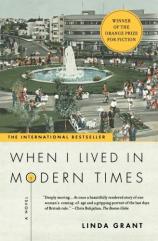When I Lived in Modern Times
Review
When I Lived in Modern Times
Some books grab your attention with the first sentence, some take a few pages, and some even need a chapter before you become engrossed. WHEN I LIVED IN MODERN TIMES by Linda Grant caught me with the second paragraph:
"This is my story. Scratch a Jew and you've got a story. If you don't like the elaborate picaresques full of unlikely events and tortuous explanations, steer clear of the Jews. If you want things to be straightforward, find someone else to listen to. You might even get to say something yourself. How do we begin a sentence? 'Listen…'"
Grant's protagonist, Evelyn Sert, grows up in London, where her grandparents settle after leaving Latvia prior to the turn of the century. Evelyn never knows her father; an American who woos her mother while visiting London in 1923. When he returns to America, he promises to marry her mother when he comes back to London. Evelyn's mother never sees him again. A hairdresser, she becomes the mistress of a wealthy Jewish merchant who provides for her by setting her up in a shop on Regent Street. Evelyn knows him as "Uncle Joe."
Joe treats Evelyn as a daughter, bringing her books and gifts on occasion, and imparting his political beliefs on her psyche. One of those beliefs is that Palestine will one day be a permanent home for Jews. A collection box for the Jewish National Fund sits on the mantel, and as Evelyn grows older, Joe brings her books and newspaper articles about life in Palestine. Evelyn's mother teaches her the art of hairdressing, but when Evelyn leaves school at 17, she wants to be an art student. Even here practical Joe influences her, getting her a job as a commercial artist in an advertising firm, rather than sending her to art school.
In the summer of 1945, after the war ends, Evelyn's mother suffers a series of strokes that so debilitate her she has to be admitted to a nursing home. After her death, Joe persuades Evelyn to follow his dream and go to Palestine. Because the British have limited Jewish immigration into Palestine, and because Evelyn has no skills that are of use to the Jewish Agency that can get her an entry permit, she chooses to lie and enter Palestine as a Christian tourist. Once there, she can simply stay on, losing herself in the crowds of Jews who have already settled there.
After trying life on a kibbutz and finding it not to her liking, Evelyn settles in Tel Aviv, a city only as old as she herself is. Unable to find any other work, she finds work in a hairdresser's shop and styles the hair of the wives of British officers posted in Palestine. At work she continues to hide her Jewish identity, using the name Pricilla and saying that her husband is a British soldier posted in Tunisia. When not with the British officers' wives, she resumes her own identity and falls in love with a Sabra, a Jew born in Palestine. She discovers that he is not what he seems; in fact, he is a member of the Irgun, the secretive Jewish terrorist group that is fighting for Palestinian independence and Jewish control.
Linda Grant won Britain's Orange Prize for Fiction for WHEN I LIVED IN MODERN TIMES, and I understand why. It is both a coming of age story, and the story of a country struggling to be born. As someone who grew up on stories of Israel's war for independence, and as a teacher of Israel's history, this book rings true. It doesn't sugarcoat the struggles of immigrants who settled there after World War II, nor does it hide the fact that Jewish terrorists did their best to chase the British out of Palestine so that they could create the country Israel for themselves. I also found the characters, especially Evelyn, to be real people complete with flaws. And, even though I found the ending a bit too simplistic and obvious, it ultimately made sense.
Reviewed by Debbie Ann Weiner on December 31, 2002
When I Lived in Modern Times
- Publication Date: December 31, 2002
- Genres: Fiction
- Paperback: 272 pages
- Publisher: Plume
- ISBN-10: 0452282926
- ISBN-13: 9780452282926


